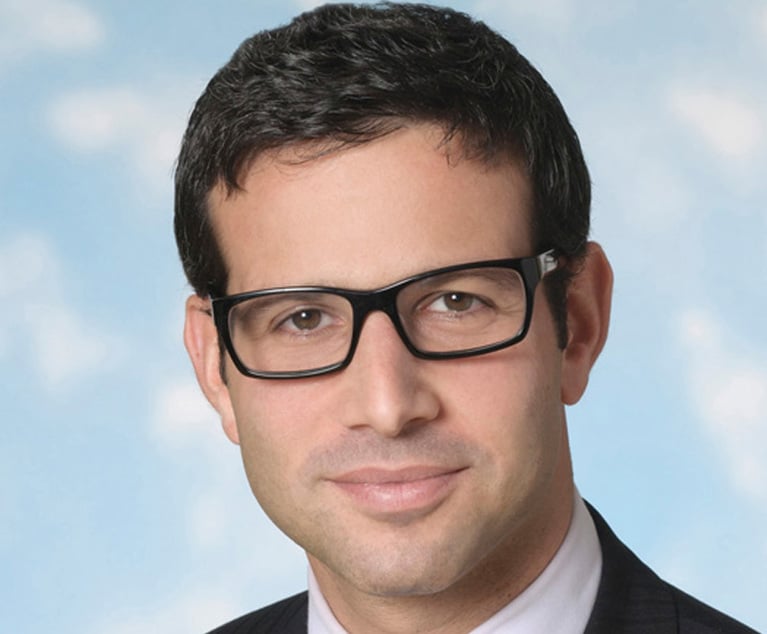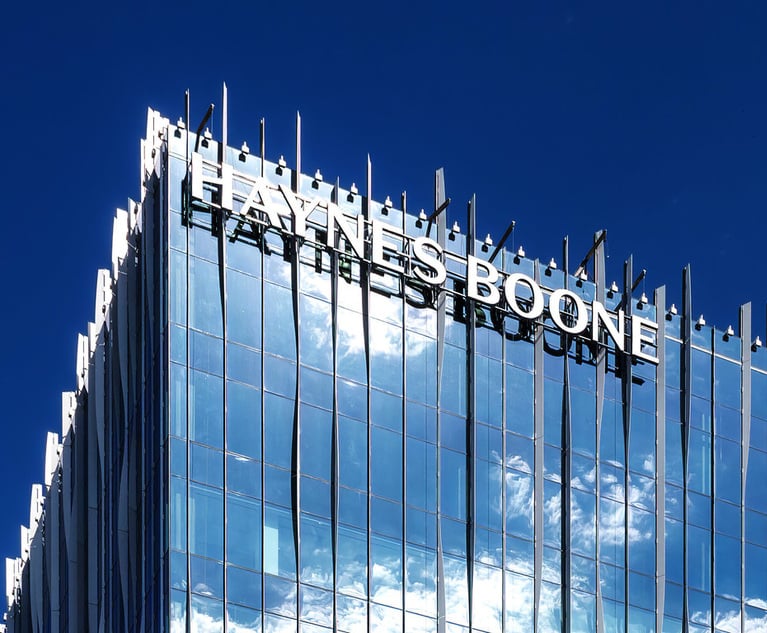Litigation Department of the Year 2018: Munck Wilson Mandala
In the mid-1990s, Bill Munck went on the hunt for the perfect place to set up a high-tech litigation firm. He was impressed with Texas' low cost of living, high-quality public universities, and concentration of tech companies in the northern part of the state. It seemed like the right perch from which to attract clients who wanted their inventions protected.
August 31, 2018 at 06:00 AM
5 minute read
 Munck Wilson Mandala litigation department..Backrow L-R: Jordan Strauss, Aaron Dilbeck, Wallace Dunwoody, Shain Khoshbin, William A. Munck;.Front row L-R: Jake LaCombe and Mike Wilson
Munck Wilson Mandala litigation department..Backrow L-R: Jordan Strauss, Aaron Dilbeck, Wallace Dunwoody, Shain Khoshbin, William A. Munck;.Front row L-R: Jake LaCombe and Mike Wilson
Finalist in the Midsize Firm Category
In the mid-1990s, Bill Munck went on the hunt for the perfect place to set up a high-tech litigation firm.
After visiting Silicon Valley, Washington, D.C., and New York, where most IP firms were concentrated at the time, he ended up rejecting both the East and West coasts and staked his claim in Dallas.
A Long Island native, and former computer science and electrical engineer who'd graduated Hofstra University's Law School in just two years, Munck was impressed with Texas' low cost of living, high-quality public universities, and concentration of tech companies in the northern part of the state. It seemed like the right perch from which to attract clients who wanted their inventions protected, he said.
“I made the pitch to my wife that we would be better off in Dallas than in California, D.C. or New York. The idea was to build a practice around a particular type of client,” Munck said.
While plenty of smaller law firms had licensed patent attorneys and litigators to serve the technology companies, not many of them had both, he explained.
“What companies need is IP and licensing and labor and employment as well as litigation. Our client base is 70 percent high-tech,'' Munck said. “Over the years we decided we weren't going to be just an IP firm; we were going to be an IP litigation firm.”
And to stand out from other firms, Munck Wilson Mandala assigned two different kinds of patent attorneys to each case.
“Patent lawyer aren't necessarily the best litigators. They just talk too much. We were going to build a patent firm by putting a patent lawyer and litigator on every case. We built our teams that way, and over the years we built a very successful litigation firm,'' he said.
The firm's $10.1 million patent infringement verdict last year against Nintendo in front of a federal jury in Dallas is a perfect example of how Munck's plan is working out. The firm represented Dallas-based technology company iLife against the gaming giant, alleging it had infringed iLife's patent for a motion-detection device that was used in Nintendo's Wii gaming systems.
Munck had originally helped write the patent for iLife's motion-detection technology. But when it came time for the small company client to take on Nintendo 20 years later in a federal courtroom, Munck left that job up to Mike Wilson, one of the firm's most experienced litigators.
A key moment in the trial occurred when Nintendo general counsel Devon Pritchard took the stand and charmed the jury by testifying about how the Wii brought her whole family together and led her 94-year-old grandmother to bowl again. Her testimony, Wilson said, was meant to demonstrate that the Wii success was mostly driven by brand loyalty to iconic characters like “Mario” rather than on the technology iLife had invented.
But when it came time to cross-examine Pritchard, Munck Wilson associate Jordan Strauss got Pritchard to admit that the prior Nintendo “Cube” console was a failure, and that games such as Wii Sports uses avatars, not iconic characters. The question Strauss posed to Pritchard was, if she was playing Wii with her avatar, certainly that doesn't make her avatar an iconic character. The question got the biggest laugh of the trial, and showed that Strauss was capable of out-charming her witness, according to Wilson.
“We just felt like if anyone was going to beat up on a corporate rep, it shouldn't be me,” Wilson said of the decision to have a young associate cross-examine an important witness. “She deserved it. She worked hard on the case, as did everyone.''
Wilson said his small team of attorneys, including partners Wallace Dunwoody and Shain Khoshbin, faced a much bigger team of lawyers representing Nintendo.
“We had no choice but to make this a team effort. At one point Nintendo had 20 Cooley lawyers in the courtroom with us,” Wilson said. “They were making it pretty hard on us.”
And in late 2017, Munck Wilson lawyers also helped defend the same iLife patent before the U.S. Court of Appeals for the Federal Circuit after Nintendo had unsuccessfully sought to invalidate it through inter partes review at the U.S. Patent and Trademark Office.
In addition to representing small Dallas-based tech businesses like iLife, Munck Wilson's client list has grown to include a host of big-name clients such as Raytheon, Honeywell, Southwest Airlines and Galderma Laboratories. And to serve those clients, the firm currently employs 60 attorneys, half of whom are licensed patent attorneys.
“Our practice is probably 20 percent local and 80 percent outside of Dallas now,” Munck said. “We have clients in Europe and in the Pacific Rim.”
“Dallas is becoming a tech hub. If you asked if I thought it was going to be like this, I wouldn't have believed it,” Munck added. “But I'm glad I was right.''
This content has been archived. It is available through our partners, LexisNexis® and Bloomberg Law.
To view this content, please continue to their sites.
Not a Lexis Subscriber?
Subscribe Now
Not a Bloomberg Law Subscriber?
Subscribe Now
NOT FOR REPRINT
© 2025 ALM Global, LLC, All Rights Reserved. Request academic re-use from www.copyright.com. All other uses, submit a request to [email protected]. For more information visit Asset & Logo Licensing.
You Might Like
View All
Kirkland's Daniel Lavon-Krein: Staying Ahead of Private Equity Consolidation

Vinson & Elkins: Traditional Energy Practice Meets Energy Transition
4 minute read
Advising 'Capital-Intensive Spaces' Fuels Corporate Practice Growth For Haynes and Boone
4 minute read
Get to Know Texas Lawyer's Attorney of the Year Finalists
Trending Stories
- 1'Pull Back the Curtain': Ex-NFL Players Seek Discovery in Lawsuit Over League's Disability Plan
- 2Tensions Run High at Final Hearing Before Manhattan Congestion Pricing Takes Effect
- 3Improper Removal to Fed. Court Leads to $100K Bill for Blue Cross Blue Shield
- 4Michael Halpern, Beloved Key West Attorney, Dies at 72
- 5Burr & Forman, Smith Gambrell & Russell Promote More to Partner This Year
Who Got The Work
Michael G. Bongiorno, Andrew Scott Dulberg and Elizabeth E. Driscoll from Wilmer Cutler Pickering Hale and Dorr have stepped in to represent Symbotic Inc., an A.I.-enabled technology platform that focuses on increasing supply chain efficiency, and other defendants in a pending shareholder derivative lawsuit. The case, filed Oct. 2 in Massachusetts District Court by the Brown Law Firm on behalf of Stephen Austen, accuses certain officers and directors of misleading investors in regard to Symbotic's potential for margin growth by failing to disclose that the company was not equipped to timely deploy its systems or manage expenses through project delays. The case, assigned to U.S. District Judge Nathaniel M. Gorton, is 1:24-cv-12522, Austen v. Cohen et al.
Who Got The Work
Edmund Polubinski and Marie Killmond of Davis Polk & Wardwell have entered appearances for data platform software development company MongoDB and other defendants in a pending shareholder derivative lawsuit. The action, filed Oct. 7 in New York Southern District Court by the Brown Law Firm, accuses the company's directors and/or officers of falsely expressing confidence in the company’s restructuring of its sales incentive plan and downplaying the severity of decreases in its upfront commitments. The case is 1:24-cv-07594, Roy v. Ittycheria et al.
Who Got The Work
Amy O. Bruchs and Kurt F. Ellison of Michael Best & Friedrich have entered appearances for Epic Systems Corp. in a pending employment discrimination lawsuit. The suit was filed Sept. 7 in Wisconsin Western District Court by Levine Eisberner LLC and Siri & Glimstad on behalf of a project manager who claims that he was wrongfully terminated after applying for a religious exemption to the defendant's COVID-19 vaccine mandate. The case, assigned to U.S. Magistrate Judge Anita Marie Boor, is 3:24-cv-00630, Secker, Nathan v. Epic Systems Corporation.
Who Got The Work
David X. Sullivan, Thomas J. Finn and Gregory A. Hall from McCarter & English have entered appearances for Sunrun Installation Services in a pending civil rights lawsuit. The complaint was filed Sept. 4 in Connecticut District Court by attorney Robert M. Berke on behalf of former employee George Edward Steins, who was arrested and charged with employing an unregistered home improvement salesperson. The complaint alleges that had Sunrun informed the Connecticut Department of Consumer Protection that the plaintiff's employment had ended in 2017 and that he no longer held Sunrun's home improvement contractor license, he would not have been hit with charges, which were dismissed in May 2024. The case, assigned to U.S. District Judge Jeffrey A. Meyer, is 3:24-cv-01423, Steins v. Sunrun, Inc. et al.
Who Got The Work
Greenberg Traurig shareholder Joshua L. Raskin has entered an appearance for boohoo.com UK Ltd. in a pending patent infringement lawsuit. The suit, filed Sept. 3 in Texas Eastern District Court by Rozier Hardt McDonough on behalf of Alto Dynamics, asserts five patents related to an online shopping platform. The case, assigned to U.S. District Judge Rodney Gilstrap, is 2:24-cv-00719, Alto Dynamics, LLC v. boohoo.com UK Limited.
Featured Firms
Law Offices of Gary Martin Hays & Associates, P.C.
(470) 294-1674
Law Offices of Mark E. Salomone
(857) 444-6468
Smith & Hassler
(713) 739-1250






